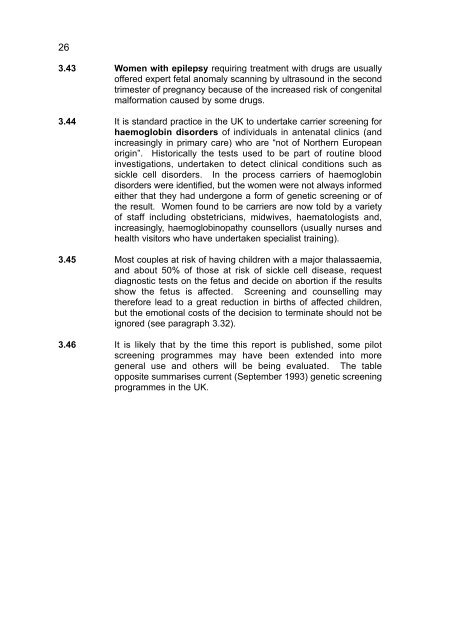Genetic screening: ethical issues - Nuffield Council on Bioethics
Genetic screening: ethical issues - Nuffield Council on Bioethics
Genetic screening: ethical issues - Nuffield Council on Bioethics
You also want an ePaper? Increase the reach of your titles
YUMPU automatically turns print PDFs into web optimized ePapers that Google loves.
26<br />
3.43 Women with epilepsy requiring treatment with drugs are usually<br />
offered expert fetal anomaly scanning by ultrasound in the sec<strong>on</strong>d<br />
trimester of pregnancy because of the increased risk of c<strong>on</strong>genital<br />
malformati<strong>on</strong> caused by some drugs.<br />
3.44 It is standard practice in the UK to undertake carrier <str<strong>on</strong>g>screening</str<strong>on</strong>g> for<br />
haemoglobin disorders of individuals in antenatal clinics (and<br />
increasingly in primary care) who are “not of Northern European<br />
origin”. Historically the tests used to be part of routine blood<br />
investigati<strong>on</strong>s, undertaken to detect clinical c<strong>on</strong>diti<strong>on</strong>s such as<br />
sickle cell disorders. In the process carriers of haemoglobin<br />
disorders were identified, but the women were not always informed<br />
either that they had underg<strong>on</strong>e a form of genetic <str<strong>on</strong>g>screening</str<strong>on</strong>g> or of<br />
the result. Women found to be carriers are now told by a variety<br />
of staff including obstetricians, midwives, haematologists and,<br />
increasingly, haemoglobinopathy counsellors (usually nurses and<br />
health visitors who have undertaken specialist training).<br />
3.45 Most couples at risk of having children with a major thalassaemia,<br />
and about 50% of those at risk of sickle cell disease, request<br />
diagnostic tests <strong>on</strong> the fetus and decide <strong>on</strong> aborti<strong>on</strong> if the results<br />
show the fetus is affected. Screening and counselling may<br />
therefore lead to a great reducti<strong>on</strong> in births of affected children,<br />
but the emoti<strong>on</strong>al costs of the decisi<strong>on</strong> to terminate should not be<br />
ignored (see paragraph 3.32).<br />
3.46 It is likely that by the time this report is published, some pilot<br />
<str<strong>on</strong>g>screening</str<strong>on</strong>g> programmes may have been extended into more<br />
general use and others will be being evaluated. The table<br />
opposite summarises current (September 1993) genetic <str<strong>on</strong>g>screening</str<strong>on</strong>g><br />
programmes in the UK.
















